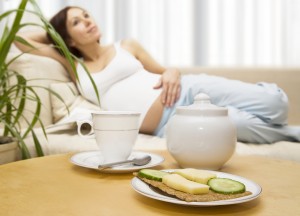
You may have heard that some foods are not safe to eat during pregnancy. That’s because your developing baby is much more sensitive to germs and other toxins that a fully grown person is generally better able to fight off.
As a mom-to-be who wants to do what she can to help insure the health and comfort of her unborn baby, your diet should consist of natural, whole foods: lean meats, lots of fruits and vegetables, whole grains, and dairy products.
But even if you stick to those healthy guidelines, you still have to watch out for some foods, including the following:
1. Raw or undercooked foods from animal sources:
Avoid rare meats, raw fish (sushi), raw oysters and clams, unpasteurized eggs, and raw cookie or cake dough. These foods can harbor many kinds of bacteria, viruses and parasites. The solution: fully cook all meats (red meat and poultry are fully cooked when you no longer see red juices come out after pricking or cutting into meat. Cook eggs until they are not runny.
2. Processed Meats, Hot Dogs and Unpasteurized Dairy:
These foods, which include processed turkey and ham, can sometimes have the bacterium Listeria. Listeria infections (listeriosis) are rare, but serious. They can result in miscarriage, stillbirth or other major health complications for the baby.
Aside from possible bacteria contamination, processed meats and hot dogs generally have strong artificial preservatives like sodium nitrite, which have nothing to do with nutrition and could possibly even harm you. Hot dogs are especially notorious for being a chock-full of chemicals and lots of salt, at a time when you want to avoid chemicals and go easy on salt. Healthier choices in processed meats would be: canned chunk light tuna in oil and canned salmon, as these have no artificial ingredients.
As for dairy foods, pregnancy is a time when you want to be getting healthy doses of calcium for your growing baby, in addition to the calcium that you must consume to support your own body’s structure and functions. Eat and drink dairy, but be sure that the food label says “pasteurized.” Avoid soft cheeses, as these are often not pasteurized. Examples of soft cheeses include: feta, Brie, Camembert, Roquefort, blue cheese, queso fresco, queso panela and goat cheese. Hard cheeses are considered safer; these include: cheddar, mozzarella, Swiss and all-natural parmesan. The good news? If you’re a fan of soft cheeses, just make sure you cook them before eating. Bacteria are killed when you heat cheese to the point of melting or bubbling.
3. Certain Types of Fish:
Fish is very healthy, lean protein; the Food and Drug Administration advises pregnant and nursing women to eat up to 12 ounces of fish per week — that is, fish that’s low in mercury.
By now, you’ve heard about the mercury controversy. Humans are exposed to mercury from different sources, but the single biggest source are coal-burning power plants. Mercury is a poisonous metal known to be particularly bad for unborn babies, as it interferes with the infant’s developing central nervous system (the brain and the spinal cord).
Experts recommend that pregnant women completely avoid eating fish that tend to have higher mercury content; these are generally the bigger fish, including swordfish, shark, marlin and king mackerel. Safer, smaller fish for expecting women to eat include: salmon (farmed or wild-caught), sole, chunk light tuna (albacore tuna tends to have a bit higher mercury content), tilapia, sardines, catfish and shrimp.
4. Caffeine, Some Herbal Teas and Alcohol:
Caffeine should be consumed by pregnant women only in moderation, if at all, as excessive consumption has been linked in studies to miscarriage, pre-term birth and low birth weight. Limit your consumption to no more than two cups of coffee daily and use no artificial sweeteners or creamers. Also, if you enjoy drinking non-caffeinated herbal teas, check with your doctor that the herb you use is safe during pregnancy.
As for alcohol, most health experts agree that it’s best for a pregnant woman to avoid it altogether, due to the powerful adverse effects that it can have in a developing baby. Alcohol has been found to be especially harmful in the first few months of pregnancy — a time when some women don’t yet realize that they’re pregnant. So, if you are of child-bearing age and are sexually active, it is important to keep track of your monthly menstrual cycles.
5. Go Easy on Spicy Foods:
Not only can they give a pregnant woman heartburn, but if it’s true as scientists increasingly believe, that babies in the womb can taste different flavors from the different foods that their mothers eat, you don’t want to have too much spiciness in your foods while pregnant (or nursing).
By Jamell Andrews